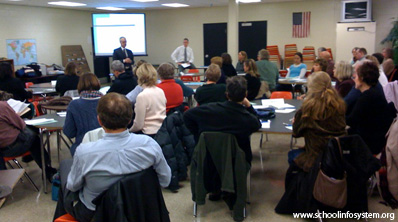Dylan Pauly, Legal Services:
Dr. Nerad recently announced his retirement effective June 30, 2013. Consequently, over the next few months this Board will be required to begin its search for the next District leader. While some members of the Board were Board members during the search that brought Dr. Nerad to Madison, many were not. A number of members have asked me to provide some background information so that they may familiarize themselves with the process that was used in 2007. Consequently, I have gathered the following documents for your review:
1. Request for Proposals: Consultation Services for Superintendent Search, Proposal 3113, dated March 19, 2007;
2. Minutes from Board meetings on February 26,2007, and March 12,2007, reflecting Board input and feedback regarding draft versions ofthe RFP;
3. Contract with Hazard, Young and Attea;
4. A copy of the Notice of Vacancy that was published in Education Week;
5. Minutes from a Board meeting on August 27, 2007, which contains the general timeline used to complete the search process; and,
6. Superintendent Search- Leadership Profile Development Session Schedule, which reflects how community engagement was handled during the previous search.
It is also my understanding that the Board may wish to create an ad hoc committee to handle various procedural tasks related to the search process. In line with Board Policy 1041, I believe it is appropriate to take official action in open session to create the new ad hoc. I recommend the following motion:
Dave Zweiful shares his thoughts on Dan Nerad’s retirement.
Related: Notes and links on Madison Superintendent hires since 1992.
Madison Superintendent Art Rainwater’s recent public announcement that he plans to retire in 2008 presents an opportunity to look back at previous searches as well as the K-12 climate during those events. Fortunately, thanks to Tim Berners-Lee’s World Wide Web, we can quickly lookup information from the recent past.
The Madison School District’s two most recent Superintendent hires were Cheryl Wilhoyte [Clusty] and Art Rainwater [Clusty]. Art came to Madison from Kansas City, a district which, under court order, dramatically increased spending by “throwing money at their schools”, according to Paul Ciotti:
2008 Madison Superintendent candidate public appearances:
The Madison Superintendent position’s success is subject to a number of factors, including: the 182 page Madison Teachers, Inc. contract, which may become the District’s handbook (Seniority notes and links)…, state and federal laws, hiring practices, teacher content knowledge, the School Board, lobbying and community economic conditions (tax increase environment) among others.
Superintendent Nerad’s reign has certainly been far more open about critical issues such as reading, math and open enrollment than his predecessor (some board members have certainly been active with respect to improvement and accountability). The strings program has also not been under an annual assault, lately. That said, changing anything in a large organization, not to mention a school district spending nearly $15,000 per student is difficult, as Ripon Superintendent Richard Zimman pointed out in 2009.
Would things improve if a new Superintendent enters the scene? Well, in this case, it is useful to take a look at the District’s recent history. In my view, diffused governance in the form of more independent charter schools and perhaps a series of smaller Districts, possibly organized around the high schools might make a difference. I also think the District must focus on just a few things, namely reading/writing, math and science. Change is coming to our agrarian era school model (or, perhaps the Frederick Taylor manufacturing model is more appropriate). Ideally, Madison, given its unparalleled tax and intellectual base should lead the way.
Perhaps we might even see the local Teachers union authorize charters as they are doing in Minneapolis.

 I enjoyed meeting and talking with Ellie Schatz recently. Listen to the conversation via
I enjoyed meeting and talking with Ellie Schatz recently. Listen to the conversation via 